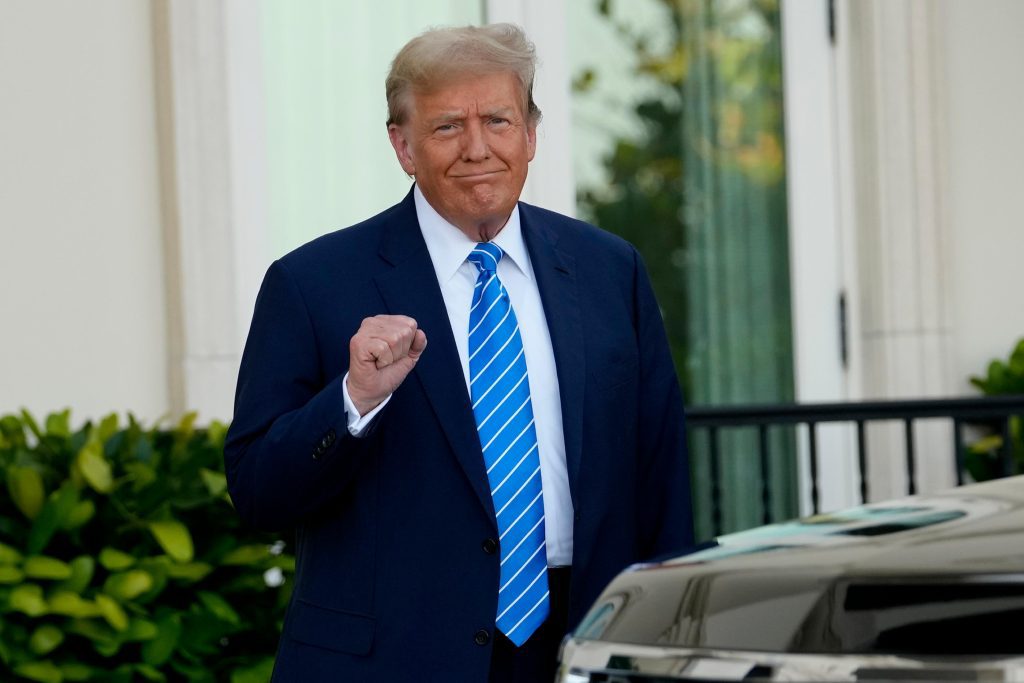By JENNIFER PELTZ and MICHAEL R. SISAK (Associated Press)
Donald Trump's attempt to postpone his hush money criminal trial has been rejected by a New York appeals court judge. If there are no further court actions, jury selection will start next week as planned.
Justice Cynthia Kern's decision is another setback for Trump, who has been trying to delay the trial multiple times.
Trump’s lawyers wanted the trial to wait until a full panel of appellate court judges could consider arguments on changing a gag order that prevents him from talking publicly about the case.
The lawyers for Trump, who is likely to be the Republican nominee, argue that the gag order violates his free speech rights as he campaigns for president and fights criminal charges.
At an emergency hearing on Tuesday, Trump's lawyer Emil Bove said that the gag order is causing irreparable harm to Trump's First Amendment rights.
Bove argued that Trump should be allowed to speak out, especially since his former lawyer and fixer Michael Cohen and adult film star Stormy Daniels, key prosecution witnesses, have been criticizing him publicly.
Steven Wu, the appellate chief for the Manhattan district attorney’s office, said that protecting the integrity of the trial is in the public interest.
Wu pointed out that Trump's statements are not just political debate, but insults.
The trial judge, Juan M. Merchan, imposed the gag order last month at the request of Manhattan prosecutors, who cited Trump’s history of making inflammatory remarks about people involved in his legal cases.
Merchan expanded the gag order last week to include comments about his own family after Trump attacked his daughter, a Democratic political consultant, and made false claims about her on social media.
This was the second time in as many days that Trump's lawyers were in the appeals court.
Yesterday, Associate Justice Lizbeth González turned down the defense’s request to delay the April 15 trial while Trump tries to move the case out of heavily Democratic Manhattan.
Trump’s lawyers presented their gag order appeal as a lawsuit against Merchan. In New York, judges can be sued to challenge some decisions under a state law known as Article 78.
Trump has used this strategy before, including against the judge in his civil fraud trial last fall and again when that judge imposed a gag order on him.
The hush-money criminal case against Trump involves accusations that he altered his company’s records to hide the nature of payments to Cohen, who helped him suppress negative stories during his 2016 campaign. Cohen’s activities included paying Daniels $130,000 to keep quiet about her claims of an extramarital encounter with Trump years earlier.
Last year, Trump pleaded not guilty to 34 felony counts of altering business records. He has denied having a sexual encounter with Daniels. His lawyers argue that the payments to Cohen were legitimate legal expenses.
Trump has tried many times to delay the trial, sticking to the strategy he announced to TV cameras outside a February pretrial hearing: "We want delays."
Last week, as Merchan rejected various requests to delay the trial, Trump again asked for the judge to step aside from the case. The judge turned down a similar request last August.
Trump’s lawyers claim the judge is unfair to him and has a conflict of interest because of his daughter Loren’s work as president of Authentic Campaigns, whose clients have included President Joe Biden and other Democrats. They complained the expanded gag order was shielding the Merchans “from legitimate public criticism.”
Merchan had been hesitant to impose a gag order. At Trump’s arraignment in April 2023, he warned Trump not to make statements that could provoke violence or endanger safety, but did not muzzle him. At a subsequent hearing, Merchan acknowledged Trump’s “special” status as a former president and current candidate and said he was “bending over backwards” to ensure Trump has every opportunity “to speak in furtherance of his candidacy.”
Merchan became increasingly worried about Trump’s language disrupting the historic trial as it approached. In issuing the gag order, he stated his duty to guarantee the integrity of the proceedings was more important than First Amendment concerns.
The gag order does not prevent comments about Merchan, who Trump has called “a Trump-hating judge” with a family full of “Trump haters,” or about Manhattan District Attorney Alvin Bragg, an elected Democrat.
Trump responded on social media that the gag order was “illegal, un-American, unConstitutional” and said Merchan was “wrongfully attempting to deprive me of my First Amendment Right to speak out against the Weaponization of Law Enforcement” by Democratic rivals.
Trump suggested without evidence that Merchan’s decision making was influenced by his daughter’s professional interests and made a claim, later refuted by court officials, that Loren Merchan had posted a social media photo showing Trump behind bars.
After the outburst, Merchan extended the gag order on April 1 to stop Trump from making statements about the judge’s family or Bragg’s family.
“They can talk about me but I can’t talk about them???” Trump reacted on his Truth Social platform. “That sounds fair, doesn’t it? This Judge should be recused, and the case should be thrown out.”
Trump filed a similar legal challenge last year over a gag order in his civil fraud case.
Judge Arthur Engoron had issued that order after Trump criticized the judge’s principal law clerk in a social media post. The gag order prevented parties in the case — and, later, their lawyers as well — from making public comments about court staffers, though not about the judge himself.
A single appeals judge lifted the gag order, but a four-judge appellate panel eventually reinstated it two weeks later. The panel said Trump’s lawyers should have followed a standard appeals process instead of suing the judge. Trump’s attorneys said they had been trying to move quickly.









